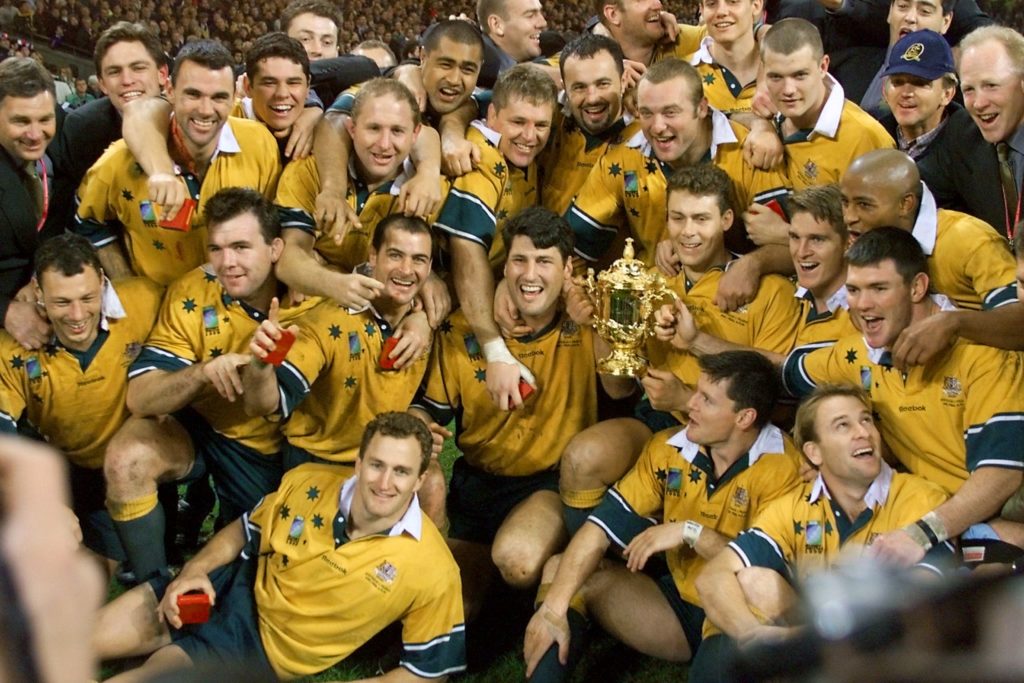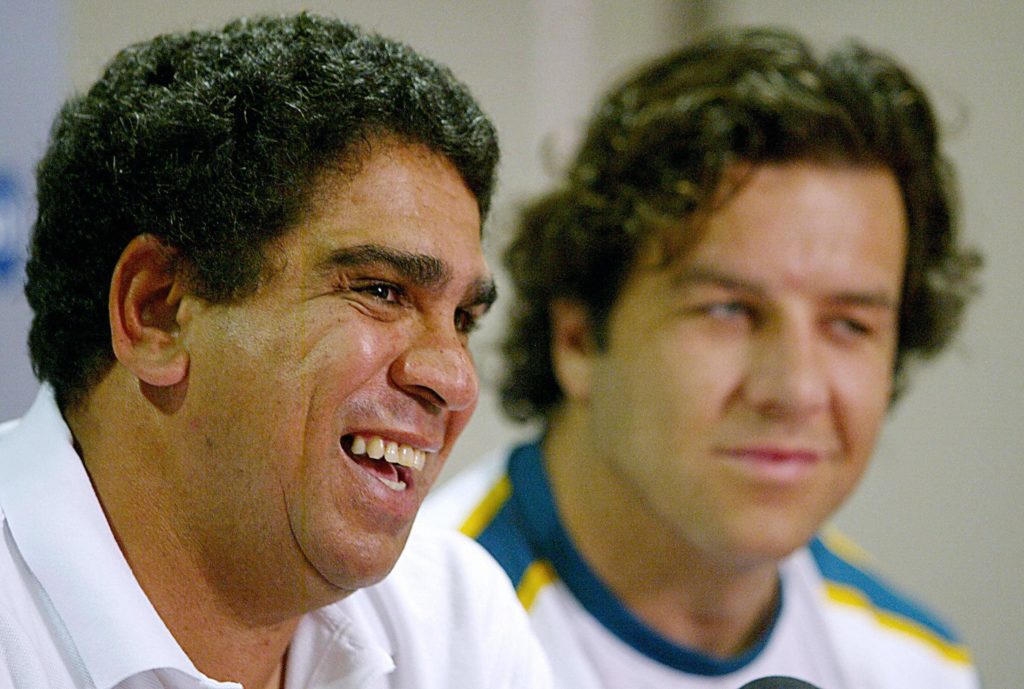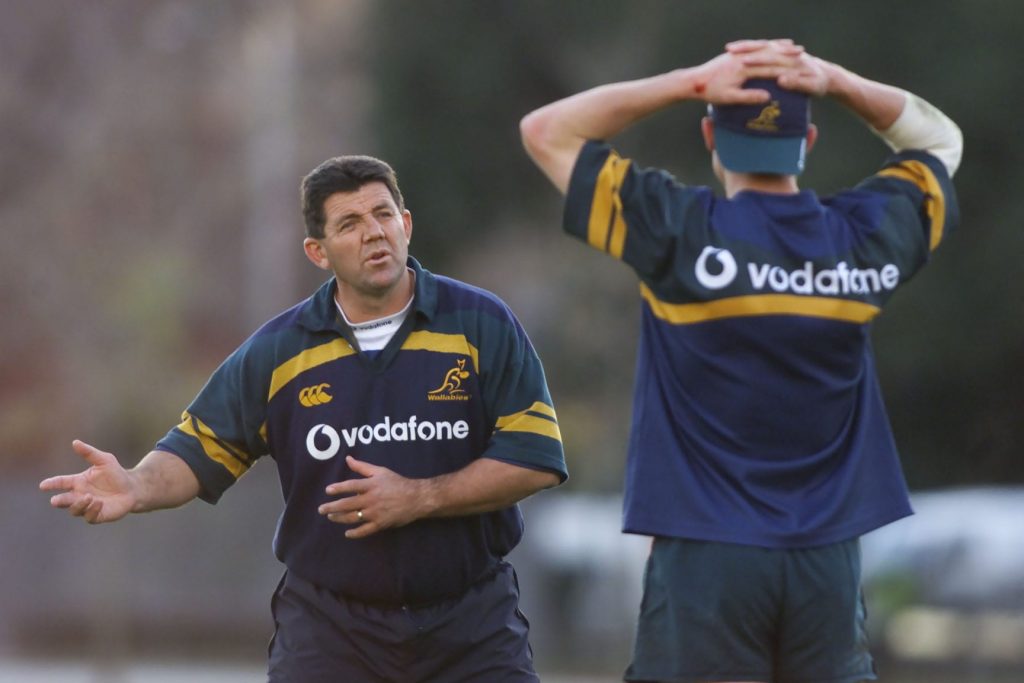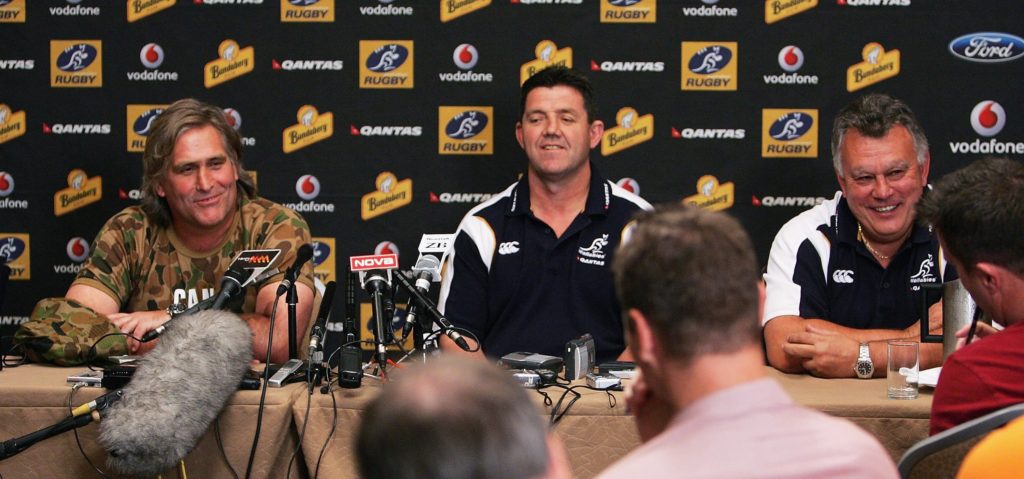The start of the greatest test match ever played is as memorable as the end.
The epic Bledisloe clash held at the Sydney Olympic stadium in the year 2000 ended, of course, with legendary All Blacks’ powerhouse Jonah Lomu storming over after the final bell to secure an historic 39-35 win.
But the start was mind-blowing.
The All Blacks completely shredded the Wallabies defence to go bang, bang, bang – scoring three tries before the clock had ticked past five minutes.
Huddled next to their own posts, down 21-0, the Wallabies looked stunned, as if they didn’t know what had hit them.
This, remember, was a team who had swept all before them 12 months earlier.
Brutalising opposition attacks with outstanding defence on their way to the podium at the 1999 World Cup, conceding only a solitary try against, of all teams, the USA.
So you can forgive the Wallabies for wondering what the hell was going on as they watched a third conversion sail over their heads.
One man definitely did know what was going on.
Stalking the sidelines was the man credited with creating a near-impregnable Wallabies defence, and changing the global game of rugby forever in the process.
Grizzled rugby league veteran turned Australian defence coach John Muggleton had such an impact in 1999 that the other international teams were scrambling to find their own league import.
But back in Sydney ‘Muggo’ had just watched on as his core defensive structures were unpicked by the All Blacks, to devastating effect.
It was time to think fast. New Zealand had broken the Wallabies structure.
He has single-handedly been one of the biggest influences within rugby union in the history of the game
Jeremy Paul, ex-Wallaby hooker
Hopping off the bus in Canberra in 1998 to start his surprising shift to rugby union, the former Parramatta Eel and Australian rugby league star forward had no idea he’d become a central figure in Australian rugby’s golden era, but he already knew he was landing among kindred spirits at the Brumbies.
The job had originated after Muggleton, then assistant coach for the North Sydney Bears in rugby league, stepped in to run a defensive session for Macqueen’s Brumbies when the teams crossed paths on camp in Jindabyne, a ski town to Canberra’s south.
Macqueen had wanted a Norths player to run a defensive session for the Brumbies, but none would oblige, while Muggo was happy to step in and do it for a Brumbies shirt and hat.
The league coach ran a physical session that Macqueen videoed, famously flattening five-eighth David Knox, then retired for beers with the Brumbies players to find himself in comfortable territory talking rugby union and rugby league in equal measure.

So when Macqueen made the offer and Muggleton headed south more permanently to Canberra, he knew the team well.
So well, that two of the Brumbies playing brains trust, Rod Kafer and Justin Harrison, met their new defensive coach on arrival, and took him directly to Canberra’s Kingston Hotel to talk rugby and drink beer.
The ‘Kingo’ would become the weekly home of Wednesday night sessions with Muggleton and key players, plotting rugby dominance fuelled by schooners of beer.
One of his regular companions was hooker Jeremy Paul, who benchmarks the arrival of Muggleton as a clear step change in the game in Australia and globally.
“He has single-handedly been one of the biggest influences within rugby union in the history of the game,” Paul said. “I’ve said this for over a decade. He changed the game, from the point of view where, you know, we had one try [scored against Australia in the 1999 World Cup].
“Every single team from then on that year, got a defensive coach. It all changed. Everything changed after him.”
Prior to Muggleton’s arrival, the defensive structure for rugby teams was remarkably simple.
“His first thing was structure, like rugby union had no structure, we had no understanding [of it],” Paul recalled. “If you watch the games prior to ‘98 when he came on board, with the Wallabies and with the Brumbies structurally, players wouldn’t find themselves in the right position because we never looked at defence as being, well, not necessarily a big part of the game, but we just never structurally put ourselves into positions within the game.”
For Muggleton the game he arrived into was built very much on man-to-man defence, with each player looking to cover their opposite without a clearer understanding of a more collective approach to defending your territory and the key channels the opposition might attack through.
He started with the simple introduction of defensive roles either side of the tackle that were deliberately established, and named the pillars as they were in rugby league.
Muggo was happy to step in and do the job for a Brumbies shirt and hat.
From there Muggleton worked outwards, and introduced a deeper understanding of positional play in defence, and the roles individuals could perform to nullify multiple attacking threats.
Glen Ella, the former Wallabies player and Wallabies and England assistant coach, formed a partnership in the Australian coaching staff where he and Muggleton challenged each other.
Ella looked to break defences down as Muggleton tried to keep them intact.
“When Muggo came on board like it was sort of like a revelation,” Glen Ella says. “I jumped on board with Muggo in 2000, 2001 leading up to the Rugby World Cup, and just being involved with … the coaching strategies he was putting forward and the defensive patterns he was putting in, certainly was miles ahead of any other rugby nation in the world at that stage.”
“I can honestly say that he’s still the best defensive coach that I’ve been associated with. Because, you know, he adjusted himself on the run.“
Adjusting on the run was exactly what was needed in that Bledisloe Cup in 2000 when a record crowd was watching the All Blacks carve up their world champion Wallabies.
Muggleton saw the New Zealanders introducing a very simple but devastatingly effective change to their attack that was outflanking the Wallabies defence with ease.

“Their first pass was eliminating five of our defenders and they were flanking us every time,” Muggleton said. “So the response to that was that we spread our defence, and we got our third defender to be opposite that ball player, nominating, and really getting off the line and having a go at him.”
Muggleton had the players shift their focus out, change their alignment and placed halfback George Gregan into a sweeping defensive role. The points slowed and the Australians won their way back into the game, only to be beaten by a final All Blacks blow.
Muggleton would go on to rebuild the defensive structures as the series progressed.
The way the team responded in Sydney however, demonstrated to Paul the three key elements that Muggleton brought to the game and the teams he coached.
He’s still the best defensive coach I’ve been associated with because he could adjust himself on the run.
Glen Ella, former Wallaby attack coach
The first two are clearly the structure which changed the game, and which all other international teams copied, while the second was a renewed focus on physicality and ‘muscling up’ in defence.
Both of which were clearly pivotal in the ’99 triumph.
But the third element is not as recognised.
Muggleton was the king of communication.
In fact during Wallabies matches, he almost never stopped talking.
“He was hated by all referees,” Paul said. “Do you know that yellow box now where the [team] runners have to sit? It was because of him and his mouth to referees. That’s the Muggo box!
“He’s the one they created that for. One of the distinctive differences that he came over with from rugby league was communication and how we talk. It’s [part of your] attitude, defence is attitude and it’s your attitude and your willingness to say to your bloke ‘I’ve got him, I’ve got him, who you got, who you got’.
“But to be talking like that after 78 minutes is incredibly difficult so you know you’ve got trainers like Muggo who’d be on the field going ‘JP, man, what are you doing, open your mouth, scream.’ It would be just constant in your ear.”
Muggleton acknowledges that the painted box restricting team officials’ movements at test matches may have originated around his time.

“Yeah, (former test referee and referees’ boss) Paddy O‘Brien calls it [the Muggo box] as well,” Muggleton conceded. “But the key part to communication is if you’ve just got that one bloke and he’s yelling at players all the time, you don’t have any communication. What you’ve got is one bloke. I always say that unless you get an answer or unless you give an answer to that bloke there’s no communication taking place.
“We used to talk about the butterfly effect. You know … you come up with a gimmick every once in a while. It’s if I don’t communicate, if I’m the outside centre and I want to rush up because I think I can knock it off. Well, I can’t do that unless I take my winger with me, unless I let the inside centre know, then three of us are working together, and we’re a chance of getting a result. But me by myself doing it, we’ve got zero chance unless you’ve got a poor attack against you. So it is the most important thing. It’s [actually] the second most important thing to footwork.”
Footwork?
And here we get to one of those simple elements in sport that is so often overlooked.
One of the focuses Muggleton brought to Australian rugby was to coach players on how you moved your feet.
In that first ever session he ran with the Brumbies for a “shirt and hat”, he’d asked David Knox to run at him, then shifted his weight and completely flattened the five-eighth.
Footwork.
“When I first started at the Wallabies and the Brumbies I always used to quote Walter Lindrum,” Muggleton said. “[Lindrum] wrote a book on snooker. He was a famous Australian snooker player and they actually changed the rules because he was so good.
“He had a chapter in his book on footwork. So if footwork is so important in a game like snooker, imagine how important it is in rugby. We did a lot of work on footwork … because I think 80 per cent of tackles are missed because people put themselves in a position where they can’t possibly make the tackle. You’ve got to give them every opportunity to get in the right position first, before they can execute the tackle.”
Part of Muggleton’s legacy in the game of rugby union is clearly teaching players how to be in the right position at the right time.
Part of Muggleton’s legacy in the game of rugby union is clearly teaching players how to be in the right position at the right time.
Muggleton is coaching Penrith in Sydney’s Shute Shield club competition, and watching the evolution of the game in Australia and New Zealand with interest.
And 20 years after losing the greatest test match of all time, a game that sent the rugby league veteran back to the drawing board to rebuild the structures for the Australian rugby union team, he’s still a rugby union coach.

Recently returned from Japan, Muggleton is coaching Penrith in Sydney’s Shute Shield club competition, and watching the evolution of the game in Australia and New Zealand with interest.
Twenty years after his team were picked apart by a shift in play from the All Blacks that he had to counter, he sees warning signs for those same New Zealanders as they look to build a future competition structure.
Muggleton would be quite happy if New Zealand went it alone and built a largely domestic competition, as he believes their teams are far too generic in style and their successful era would be threatened.
“New Zealand [today], all the teams basically have one way of playing and so do the All Blacks,” Muggleton said. “They’ve got a centralised system and they coach pretty well the same.
“The whole house of cards will come down when somebody breaks it, you know, when somebody breaks what they’re doing. They’re gonna break all five of their Super Rugby teams [at once]. And they’re gonna break the All Blacks as well, because the way they play is very, very generic.
“So if you can, if somebody can get there and break it down, and other people can then start copying it, the whole house of cards is going to come down. So you know it’s just we need that person to come out of the woodwork and find the right players and the right system and then it’s game on again.”
We’ve already seen that happen at least once, when Rod Macqueen plucked John Muggleton out of rugby league and into international rugby to teach the Wallabies, and the rugby world, a new way of winning.
Right place, right time.
If you’ve enjoyed this article, please share it with friends or on social media. We rely solely on new subscribers to fund high-quality journalism and appreciate you sharing this so we can continue to grow, produce more quality content and support our writers.



Comments
Join free and tell us what you really think!
Sign up for free